Monday, October 7, 2024. Annette’s News Roundup.
On the occasion of the anniversary of October 7.
A year ago, on October 7, 2023, at around 6:30 a.m, fighters from the terrorist group Hamas breached the Gaza-Israel perimeter fence Israel, and killed 200 Israelis, injuring more than 1,200, often in brutal and unspeakable acts. 251 — some Israelis, some holding other passports including American citizens, were kidnapped and taken hostage.
According to NBC News,
of the 251 abducted, 154 have been freed or rescued and 97 remain in Gaza, including 33 believed to be dead, Israel says.
According to the Palestinian Ministry of Health, in the last year, Israeli operations that followed October 7, have killed at least 41,788 people in Gaza, including more than 16,000 children, with 95,000 wounded.
Soon after the Oct. 7 attack, Hezbollah, the Iran supported terrorist group located in Lebanon, stepped up its own strikes on Israel. These, often met by deadly responses from Netanyahu’s government, have continued throughout the year.
Recently, on September 18th, the situation with Hezbollah escalated. Israel carried out an espionage-style attack using the Hezbollah’s own pagers and walkie-talkies, killed its leader Hassan Nasrallah and more than a dozen of his senior officials. Hezbollah responded by firing some 200 missiles at Israel.
On Tuesday, with this violent situation ever threatening to spiral further out of control, Netanyahu vowed to make Tehran “pay” for the “big mistake.” Iran, in turn, has vowed to hit back much harder if Israel strikes it.
How do we end this? Will this violence and hatred ever stop?
Below is the approach one man, following his mother’s example, is taking.
Work for, 🙏 for peace.
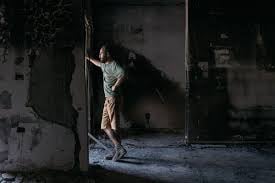
His Mother Was Killed by Hamas. Her Death Transformed His Life.
The son of a peace activist brutally killed on Oct. 7 is determined to make sure that her dream for Israel does not die with her.
Yonatan Zeigen in Kibbutz Be’eri, Israel, in August, visiting the home where his mother, Vivian Silver, was killed during the Oct. 7 massacre.Credit...CreditAvishag Shaar-Yashuv for The New York Times.
The day Vivian Silver’s home burned, her backyard was scattered with her grandchildren’s toys, a blue plastic boat upturned near a rubber duck. Vivian often spent days preparing for their visits, planning trips to the petting zoo and baking birthday cakes molded into the shape of a Barbie or a dinosaur. Her sons, Yonatan and Chen Zeigen, reminded her that she didn’t need to do so much, but Vivian measured her life by the way she made other people feel. The boys teased their mother: As a self-declared no-nonsense feminist, a renowned Israeli peace activist who was used to the sound of mortar fire, how had she stayed so soft?
Last year, in the days leading up to Oct. 7, Vivian was once again busily anticipating the arrival of Yonatan’s family from Tel Aviv. He and his partner, Maayan, would be packing their three floppy-haired children into the car for the familiar drive to his mother’s home in Kibbutz Be’eri, a desert village with socialist roots three miles from the border with Gaza. They were coming not only to celebrate Simchat Torah, the festival of the Bible, but also the 77th anniversary of the founding of the kibbutz.
But then Yonatan and Maayan changed their minds. It was time, they decided, to have their own private holiday. Be’eri, where they both grew up, was such a tight-knit community that a childhood nickname could stick to a person until they died. There, Yonatan would always be known as Vivian’s son. He wanted to separate himself: He and Maayan would build their own lives, create their own traditions. Yonatan, defiant and a little guilty, told his mother they wouldn’t be coming that day.
Twenty-four hours later, Yonatan woke up in Tel Aviv to the sound of sirens. Opening WhatsApp, he learned that hundreds of Hamas militants had crossed the border. Many of them had surged into his mother’s kibbutz.
Vivian, that morning, was utterly herself. Hiding in her safe room, as fighters came down her street, she cracked god-awful jokes in text messages to Yonatan. “Say something,” he wrote. “Something,” she replied. “I’m trying to keep my sense of humor.”
From her safe room, Vivian did a radio interview with the public broadcaster Galei Zahal, insisting the attack showed the urgent need for a peace deal. Afterward, on the phone with Yonatan, she was frustrated, recounting how the interviewer had dismissed her. In the background, he could hear gunfire and militants shouting. It sounded like his petite, 74-year-old mother was standing on a battlefield.
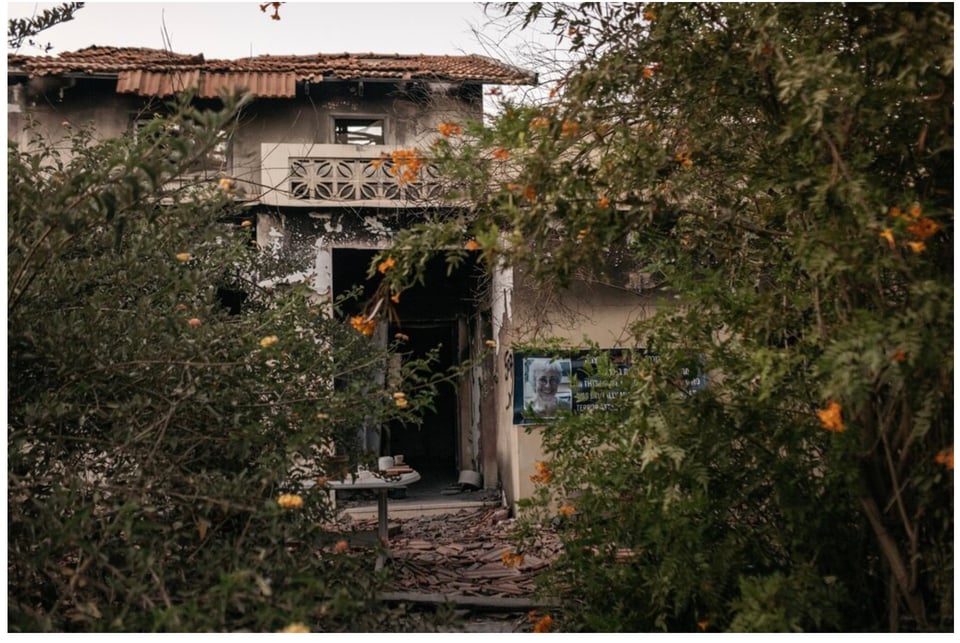
A photograph of Silver hangs at the entrance to her home, which was destroyed by Hamas militants.Credit...Avishag Shaar-Yashuv for The New York Times
“Do you want to continue speaking, or should we say goodbye?” he asked her.
“Let’s say goodbye,” Vivian told him.
When she texted him that men were inside the house, she wrote: “I’m afraid to breathe.”
“I’m with you,” Yonatan wrote.
“I feel you,” Vivian replied.
“Are you safe now?” he wrote. “Mom?” There was no response.
Yonatan lay down on his bed, his children watching cartoons in the living room. Through the night, his phone glowed with messages naming the dead at Be’eri. His mother was not among them, and by Sunday he was convinced that she had been taken hostage in Gaza. He threw himself into campaigning for her safe return, taking a leave from his job and forming a task force to lobby for her release. But five weeks later, a government liaison appeared at Yonatan’s door with the news that archaeologists had discovered bones inside Vivian’s safe room. Militants had set the house ablaze, and the bones were too damaged from the fire to be tested for DNA, but one had been matched to Vivian’s jaw through an old CT scan.
There it was, finally: sick and impossible closure. Yonatan felt an absurd longing in that moment to tell his mother how hard he had worked for her release. Then she would have understood just how much he loved her. It felt infantile, but he wanted to hear he’d made her proud.
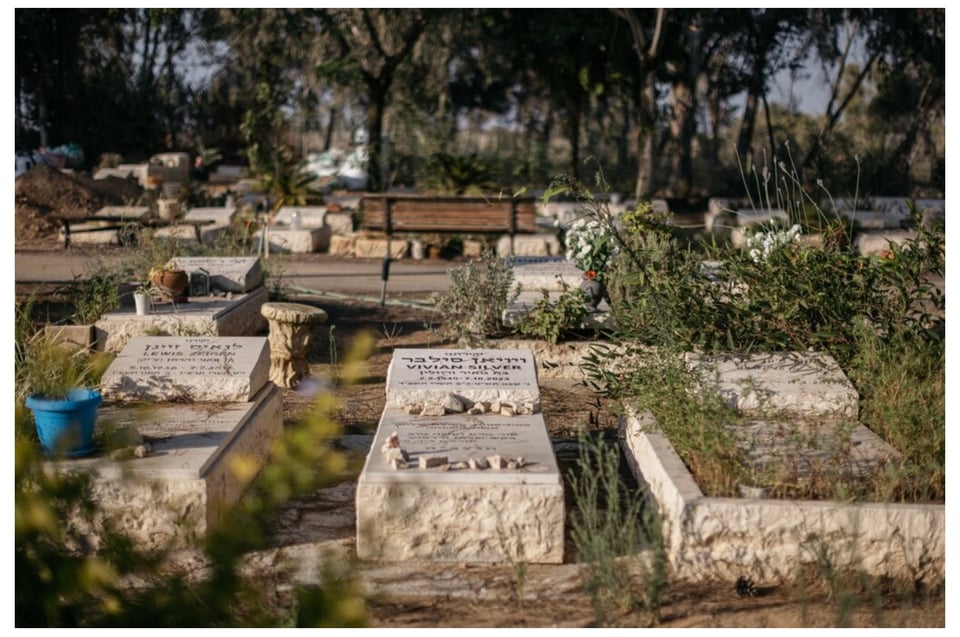
Silver’s gravestone in the Be’eri cemetery in August. The kibbutz sits just three miles from the Gaza border.Credit...Avishag Shaar-Yashuv for The New York Times
Stories about Vivian ran in Israeli and American newspapers. NBC called her a “revered peace activist,” writing: “The silver-haired grandmother is regarded on both sides of the border as an irrepressible force.” The BBC described her as “one of Israel’s best known advocates for peace,” co-founder of the 50,000-person movement Women Wage Peace. “This is a woman who dedicated her life to peace — who built bridges with Palestinians and drove sick Gazan children to the hospital herself,” said a filmmaker who had interviewed Vivian. If Hamas had killed her, some thought, perhaps there truly was no hope for peace.
More than a thousand people came to Vivian’s funeral, many of them sobbing. Yonatan was mostly stoic. His grief sat in his head. There were plenty of ways that he resembled his mother, but sentimentality wasn’t one of them. When they buried Vivian in the cemetery at Be’eri, he thought about how jarring it was to watch soldiers shovel dirt over the body of a peacenik, while tanks rolled down the nearby highway toward Gaza. After the funeral, his older brother, Chen, an archaeologist living in Connecticut, flew back to the United States to resume his daily routine and mourn their mother privately. But Yonatan felt he could not return to normal life.
Jewish ritual asks mourners to cover up mirrors in their home, so they think not about themselves but about the dead. For Yonatan, grief itself was a mirror — a call to think about who he was and who he ought to become with his mother no longer in the reflection of his life. He had spent years purposely disengaged from the conflict and from his mother’s activism, determined to focus only on his young family and his job as a social worker. He had done all he could to avoid thinking too much about his country’s grim political future. Now Yonatan felt he had been shamefully absent.
There are borders that crop up in the landscape of a person’s life. On one side is the country of before, and on the other is the land of what comes after, rockier and unmapped. That was how Yonatan felt the day he learned that Vivian had been killed. The war’s death toll was climbing rapidly, and he quickly saw how Vivian’s loss could be used as justification for more killing and destruction. On television, he heard politicians transmuting grief into talk of military might. They were celebrating a bombing campaign that had already killed thousands of civilians, and that, in Yonatan’s mind, would only result in more devastation, not security for either side.
Perhaps, Yonatan thought, his grief about his mother’s death could be expressed only through political action. After all, how could Vivian’s memory be separated from the stances she took — from her decision to call herself a “conditional Zionist,” who believed in a Jewish state only if Palestinians had a state too? How could he mourn her without continuing her activism?
Yonatan decided that grieving his mother would mean remaking his life.
To Yonatan and Chen, she was never just Vivian, their mother. She was Vivian, the activist. She seemed to shower care on her children and the wider world in equal measure. She taught them how to nurture relationships, reminding them to text “mazel tov” to old friends getting married and to keep track of birthdays. She nudged them to call each other more often. But sometimes, especially when they were little, Yonatan felt that the political side of their mother swallowed her up: Weekends were filled with phone calls, and late nights were spent poring over project proposals. Yonatan saw his mother’s work as an “addiction.”
Vivian grew up in an observant Jewish home in Winnipeg, Manitoba, and came to New York in the 1970s, where she became a feminist activist. (She met my mother there, and they became lifelong friends. I’d spend time with Vivian whenever she visited my mother, often hearing stories about her family.) In 1974, Vivian moved to Israel to help build a socialist kibbutz.
Vivian believed that ordinary people could help bring peace to the region. If more Jews could understand the distress of their Arab neighbors, she thought, the next generation would be more willing to exchange land for peace. In 2000, she helped create the Arab-Jewish Center for Equality, Empowerment and Cooperation, and later became its co-executive director, with her Bedouin colleague Amal Elsana Alh’jooj. It grew to be one of the largest nonprofit organizations in Israel devoted to equal rights. It created jobs in impoverished Arab communities and brought Arab and Jewish young people together to volunteer.
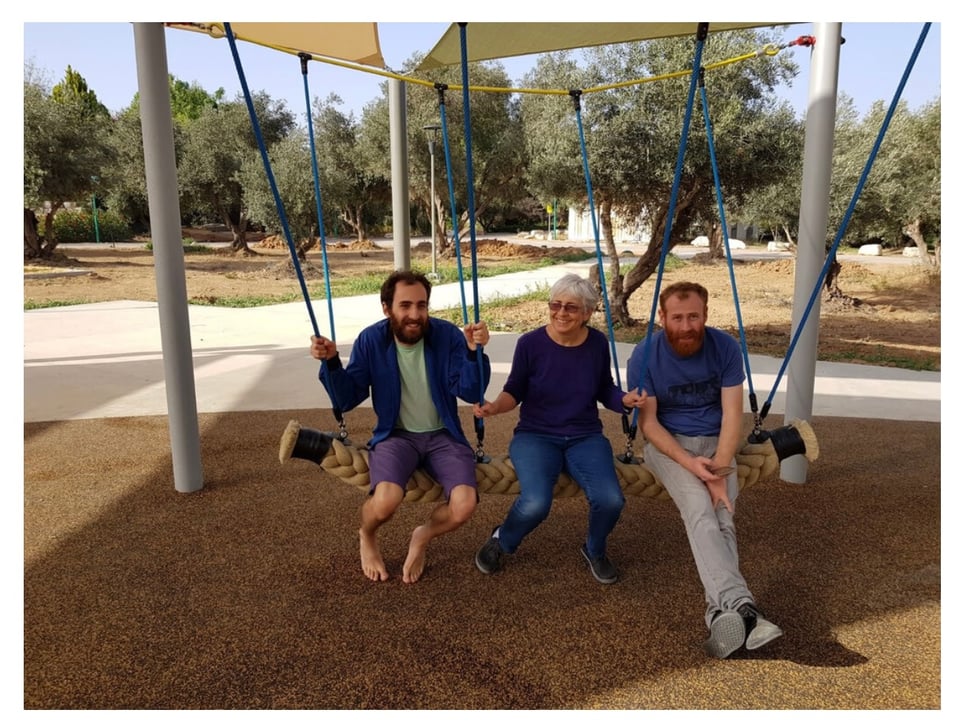
Silver with her sons, Yonatan (left) and Chen, at Kibbutz Be’eri in April 2018.Credit...Maayan Bar Tzur.
Vivian’s politics formed the backdrop of family life. Chen remembers riding on his father’s shoulders at the peace rally where Prime Minister Yitzhak Rabin was assassinated, an event that triggered the unraveling of the Oslo Accords. The boys went with Vivian to visit friends in Gaza, even as crossing the border became challenging. Yonatan and Chen remember densely packed streets, meat spinning on sticks and the taste of hookah, which one of Vivian’s friends let them smoke at his home. “Careful, Vivian,” he laughed when Yonatan inhaled. “This isn’t his first time.”
Once, when Yonatan was young, a Palestinian worker whom Vivian employed in the kibbutz’s construction crew was prevented from crossing the border for work. Yonatan asked where his friend had gone. Vivian explained that their country was in conflict with its Palestinian neighbors. “What is it about?” Yonatan asked. Vivian replied: “Land.” Yonatan filled a bucket with dirt and brought it to her, asking if that was enough land to bring back his friend.
As he got older, Yonatan felt that his mother was becoming too caught up in the emotions of her job. Vivian cried easily. Her staff liked to tease her, warning, “She’s about to cry again.” When she met with Arab families whose homes had been demolished by the Israeli government, Vivian’s face couldn’t conceal her anguish. “It can’t be this way, it can’t be this way,” a colleague remembered her repeating. “She would identify very easily with people,” Yonatan said. “I would scold her a lot of times, that other people’s pain isn’t hers.” He recalled telling her, “If you feel another person’s pain the same way they feel it, then you can’t help them.” She replied that he needed more empathy.
Yonatan reminded Vivian of herself. Like her, he was bullheaded, attached to his convictions and determined to act on them. As a teenager, Yonatan decided that “real leftists don’t eat meat,” so he became a vegan. Chen joined the Israeli Army after high school, as is typical for Jewish Israeli men because of the country’s mandatory military service. But Yonatan decided that he wouldn’t enlist, a heretical decision. Yonatan said he didn’t want to be part of an army “occupying another people,” and was disturbed by the way he heard friends justify shooting a gun. “Yorim v’bochim,” they said, which meant “shooting and crying.”
“I didn’t buy into it,” Yonatan said. “I won’t cry after I shoot. I won’t shoot to begin with.”
Yonatan moved to Haifa to get a law degree, planning to become a human rights lawyer. Though he didn’t see himself as an activist like his mother, he thought he could play some part in ending the cycle of violence by fighting for the rights of Arab Israelis. But when Maayan gave birth to their first son, in 2014, Yonatan was surprised by how quickly the lens of his mind refocused. The lofty conversations about history and politics that had consumed him seemed, suddenly, unimportant. His family became the center of his world. Yonatan decided he had agonized enough over a conflict that had only grown bloodier over the course of his life. He no longer saw himself as part of the effort to bring peace, which seemed at the time impossible. Instead, he got a master’s degree in family counseling and took a job as a social worker for the city of Tel Aviv. His days were a happy blur of diapers and milk, toys and child care.
Today he feels this change was partly rebellion, chafing at his mother’s obsessive tenacity. He disengaged while she plunged further in. At the time, in the summer of 2014, Vivian had recently retired. But then Israel went to war in Operation Protective Edge, a seven-week battle in Gaza. When the fighting ended, Vivian told Yonatan and Chen that she was helping to start a movement called Women Wage Peace, calling for more women to be involved in peace negotiations, because, she said, women understood how to compromise.
Yonatan and Chen were skeptical of Women Wage Peace. Yonatan didn’t think grass-roots organizing was effective: Why gather thousands of women to march for peace if the government was likely to dismiss them as angry grandmothers? He also felt that Women Wage Peace was trying to be too politically appeasing. The movement did not use the word “occupation,” because their goal was to get as many women as possible to join, including settlers.
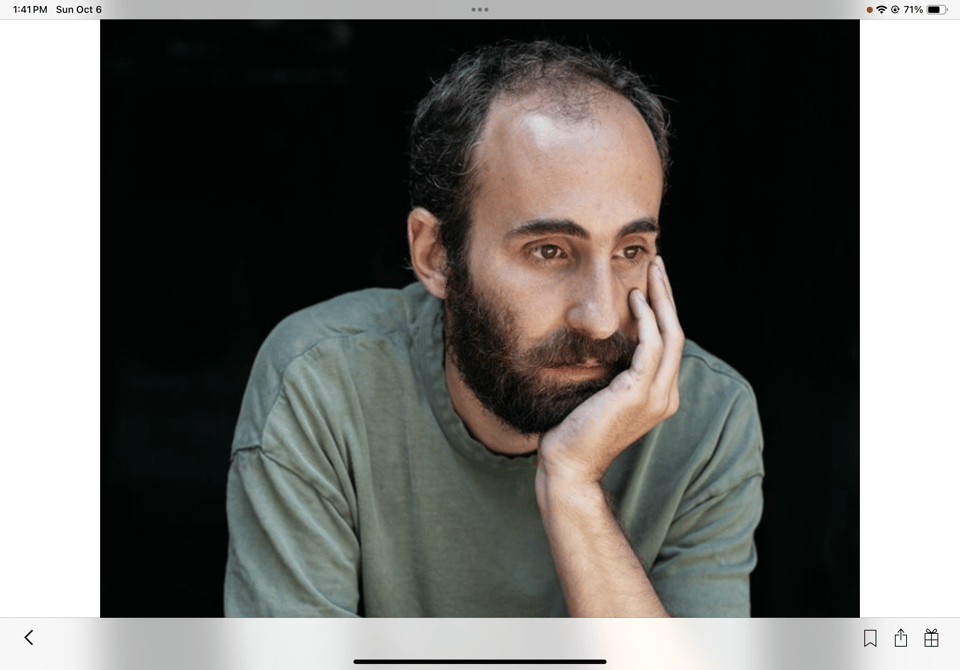
Yonatan remembers his mother trying to explain the Israeli-Palestinian conflict to him when he was young. “What is it about?” he asked. Vivian replied, “Land.” Credit...Avishag Shaar-Yashuv for The New York Times
“What is the movement if you don’t use clear language?” Yonatan asked Vivian. “You’ll have more members but no impact.”
Vivian replied: “Don’t criticize me while you’re sitting at home.”
What Yonatan calls his “political coma” lasted until the day Vivian was killed. Right after his mother’s shiva, the seven-day Jewish ritual of mourning, Yonatan quit his job as a social worker. He announced to family and friends that he would become a full-time activist for peace. He didn’t know how he would financially support his family, but with Maayan’s encouragement he gave himself a window to experiment: at least one year, which in Judaism is the official period of mourning for children who have lost their parents.
Becoming a peace activist after Oct. 7 was, in some ways, an absurd undertaking. The hope for peaceful coexistence that had animated Vivian’s work was shattered. Yonatan knew that many of his Israeli friends saw his calls to stop the bombardment in Gaza as naïve, though neighbors from Be’eri didn’t criticize him directly, because they were sensitive to his loss.
In many other parts of the world, America included, young people tend to be more liberal than their parents. In Israel, that trend is turned on its head. Polling published by the Israel Democracy Institute in 2023 found that 73 percent of Jewish Israelis between 18 and 24 call themselves right-wing, compared with 46 percent of Jewish Israelis who are 65 and over. That’s partly a product of demographics: Ultra-Orthodox families lean right, and ultra-Orthodox women have 6.6 children on average, compared with two for secular women. Young Israelis also grew up in the shadow of the second intifada, more socially isolated from Palestinians than their parents were.
In other words, Vivian was part of a generation of peaceniks fast dying out. Polling conducted after Oct. 7 found that Israelis were moving further right on political issues, including support for West Bank settlements and the re-establishment of a military occupation in Gaza. Last March and April, the Pew Research Center found that 39 percent of Israelis said the military response against Hamas in Gaza was “about right,” and 34 percent said it hadn’t gone far enough. For Yonatan, the rightward drift was motivation: “I feel this responsibility of trying to pull us in the direction of peace,” he said.
What that would look like wasn’t immediately clear to him. His mother’s life offered one blueprint, but he had to make his own. Unlike Vivian, Yonatan was skeptical of what protest alone could achieve. He didn’t spend much time at the demonstrations in Tel Aviv, where thousands were demanding a deal to bring the hostages home, because it was evident to him that Prime Minister Netanyahu wasn’t responding. Yonatan decided to focus on speaking to audiences abroad. He hoped that if other countries could make a peace deal possible, then public opinion in Israel would shift. “It’s not just that the international community is turning a blind eye,” he added. “They’re actively shaping our status quo, they’re bringing in resources without conditions.”
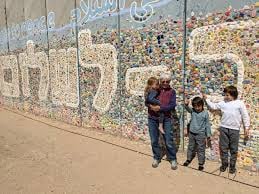
Silver and her grandchildren at the Path to Peace mosaic, which was created by thousands of visitors — Jews and Muslims alike — on the border wall dividing the Gaza Strip and Israel.Credit...Yonatan Zeigen
He traveled abroad, speaking at any organization that would have him. In March, Yonatan joined a delegation to Washington, D.C., organized by the Alliance for Middle East Peace. In a series of meetings with members of Congress and other government representatives, Yonatan argued that the United States should make its aid to Israel conditional on the country abiding by human rights law and making concessions for peace. He grew fed up as they nodded along politely. “I was under the impression I came to meet with a superpower, and you’re talking like, ‘We’re trying, we’re hoping,’” Yonatan recalled saying to one of them. “What do you mean? You have leverage.” He would have to find ways of increasing the pressure on them.
Together, Yonatan and Chen created an annual prize in Vivian’s name, recognizing a Palestinian and a Jewish woman working on peace, feminism or coexistence. Throughout the year, the brothers discussed their anguish over the war. Chen was thousands of miles away from the sirens that were sending friends to their bomb shelters, but all he wanted to do was obsessively check the news. He was finding it difficult to concentrate on his dissertation research, examining the ratio of isotopes in animal teeth and sediment from upper-Paleolithic sites in Israel. In May, Chen and his wife had a daughter, whom they named Lily Aviva, for Vivian. As a parent, Chen hoped to reflect his mother’s force of heart, her attentive care, but he chose not to be part of Yonatan’s political project. “I’m trying to take care of her as best we can and not really think about what world we’re bringing her into,” Chen said about his daughter. “She’s here. We’ve made the decision.”
While Chen tried to outswim the waves of grief, Yonatan dove in. He wasn’t really surfacing for air; he was trying to see if he could breathe underwater. Tensions were rising in the region, as Israel launched attacks on Lebanon and Hezbollah fired missiles at Israel. To many people, Yonatan’s plea — for Israel to immediately end the strikes on its neighbors and reach a permanent cease-fire — sounded detached from reality. But Yonatan felt that peace activists had to operate outside the confines of reality, to change what felt possible. He even thought about orchestrating a mock peace negotiation, a televised spectacle, to help people imagine what it would look like to have government leaders come to the table in good faith.
In his mind, Yonatan kept repeating a parable he liked to tell his children: Every person has two wolves inside them. Which survives? The one you feed. Hope or despair, peace or war. To feed the hope, that was his work. Still, he wrestled with the knowledge that his activism sucked up energy in his household, just as Vivian’s did in his childhood home. During bedtime one evening, Yonatan’s 8-year-old son asked him, “When are you going to die?”
“Not for a long time,” Yonatan replied. “Why?”
“When Savta died,” his son said, using the Hebrew word for grandmother, “you replaced her by becoming a peacemaker. When you die, I’ll need to replace you, and I’m still a kid.”
In August, I went with Yonatan to visit what was left of his mother’s home in Be’eri. We pulled up to the yellow gate outside the kibbutz, where a guard was on duty. The air was dusty, and from the direction of the Gaza border we could hear the rumble of artillery fire.
“This is my mother’s kibbutz,” Yonatan called to the guard.
“Is she here now?” the guard replied. Yonatan paused.
“She died on Oct. 7,” he said, and the guard waved us through.
Beyond the kibbutz gate, Yonatan pulled up to what remained of his mother’s house, its walls covered in burn marks. In a community of 1,000 people, 101 were killed. Vivian’s neighborhood was the first line of battle.
Yonatan smoked a cigarette before we stepped inside Vivian’s home. The ground was covered in debris and the walls in blast marks. The living room was unrecognizable, all dust and ash. The kitchen was littered with shards of pottery: the yellow handle of a mug, the fading floral paint of a dish smashed to pieces. All that remained of the bedroom was a melted bed frame. The emptiest area was the safe room, which was cleaned out in the search for Vivian’s bones. Near the front door was the imprint of a menorah that once hung on the blackened wall.
Yonatan recalled the day last October when he first visited the remains of Vivian’s house. “I thought about the valley of the shadow of death,” he said. “When you walk this road of houses, everybody is dead.” He had been hoping to feel something, he told me. He thought he might cry, but he couldn’t. “I come here and analyze,” Yonatan said. He considered what it might take to protect other families from this kind of loss. It reminded him how different he and Vivian were. She barreled into the world with her heart open; he met every situation with his mind.
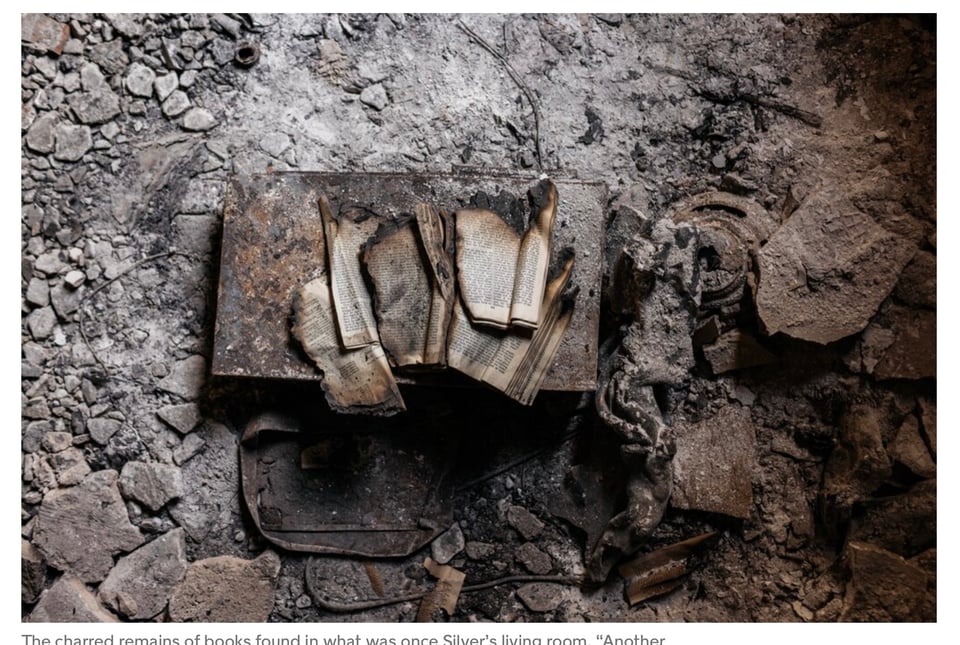
The charred remains of books found in what was once Silver’s living room. “Another person could come here and say this is the reason to kill Palestinians,” Yonatan said. “I stand here and say this is the reason to fight for peace.”Credit...Avishag Shaar-Yashuv for The New York Times.
But were they really so different? He had pleaded with her not to let her passions overtake her life. Now here he was, turning his world upside down to fill the hole in him she left behind. Yonatan’s year of mourning was nearly up, and he hadn’t yet found a way to support himself as a full-time activist. The fight for peace now consumed his life, as it consumed his mother’s. Her death had dissolved the barriers he had built between the two of them, between himself and the pain of the conflict. Standing in the dust, Yonatan said that taking on his mother’s work has been a balm. “When I’m active, then I maintain hope,” Yonatan said. “If I sit at home, it seems less plausible.” He understands why Vivian clung to her optimism all those years: It’s better than any alternative.
We walked over to the area that was once Vivian’s living room. Sifting through the detritus, we found pages from three different books that were charred but still legible. The pages, improbably, were about children and parents, journeys and leaders, and also peril. One was from the Book of Genesis, and another recounted the moment that God sent Moses to wander the desert. The last page we found in the dust was from a book about Jewish identity. “What surfaces over and over again in these and similar speculations on Jewish vulnerability is the image of the Holocaust,” it read. “It could happen here.”
Yonatan looked up at the sky through a crack in the ceiling. The second level of the house, where his children used to sleep when they visited for holidays, was entirely burned. Sunlight filtered through. “Another person could come here and say this is the reason to kill Palestinians,” Yonatan said. “I stand here and say this is the reason to fight for peace. So this won’t happen again.” He believed that the cycle of grief could twist into something new.
“Israelis always tell me that when the hostages were brought into Gaza, people cheered,” he said. “I think the same people will cheer when we bring peace.” If the very militants who destroyed his kibbutz came to him now saying they were ready to negotiate for peace, Yonatan told me he would listen openly. “Come,” he said. “Even if you killed my mother before.” (Emma Goldberg in The New York Times).
5 Tuesdays until Election Day.
Kamala Media Blitz.
Yesterday, Vice President Kamala Harris just appeared on an episode of “Call Her Daddy,” a popular podcast with Gen Z and millennial women. In a conversation that was largely focused on reproductive rights, the show’s host, Alex Cooper, talked at length with Harris about the abortion bans or restrictions that have been enacted in 20 states since Roe v. Wade was overturned in 2022. (New York Times)
There are a number of young women for whom Call Her Daddy is their go-to source for entertainment. The fact that Kamala Harris is talking directly to them, through an interview with their trusted messenger, Alex Cooper, matters. pic.twitter.com/PU3HPtxD1w
— Rachel Janfaza (@racheljanfaza) October 6, 2024
Watch the Vice President.👇
Vice President Harris calls out Trump’s lies about women and abortion: “It’s so insulting… This guy is full of lies. I just have to be very candid with you” pic.twitter.com/vEKPIuT0o3
— Kamala HQ (@KamalaHQ) October 6, 2024
Kamala Harris, Tim Walz will be featured on "60 Minutes.”
[Today,] voters will get the chance to hear from Vice President Kamala Harris … as she presents her case for why she should be president in a "60 Minutes" election special.
For decades, "60 Minutes" has featured both Republican and Democratic nominees for presidents, but this year, former President Donald Trump backed out after previously indicating he would be on the show. Correspondent Scott Pelley, who'd been set to interview Trump, will instead travel to Arizona's Maricopa County, home to more than 60% of Arizona's voters and a critical battleground in a key swing state. (CBS News).
The 60 minute interview is set to broadcast at 8 p.m. EST on Monday, according to CBS News.
The Harris campaign announced on Sunday that she would appear this Tuesday on ABC’s “The View”; Howard Stern’s satellite radio program; and “The Late Show with Stephen Colbert.” On Thursday, she will be on Univision.

More Trump Lies.
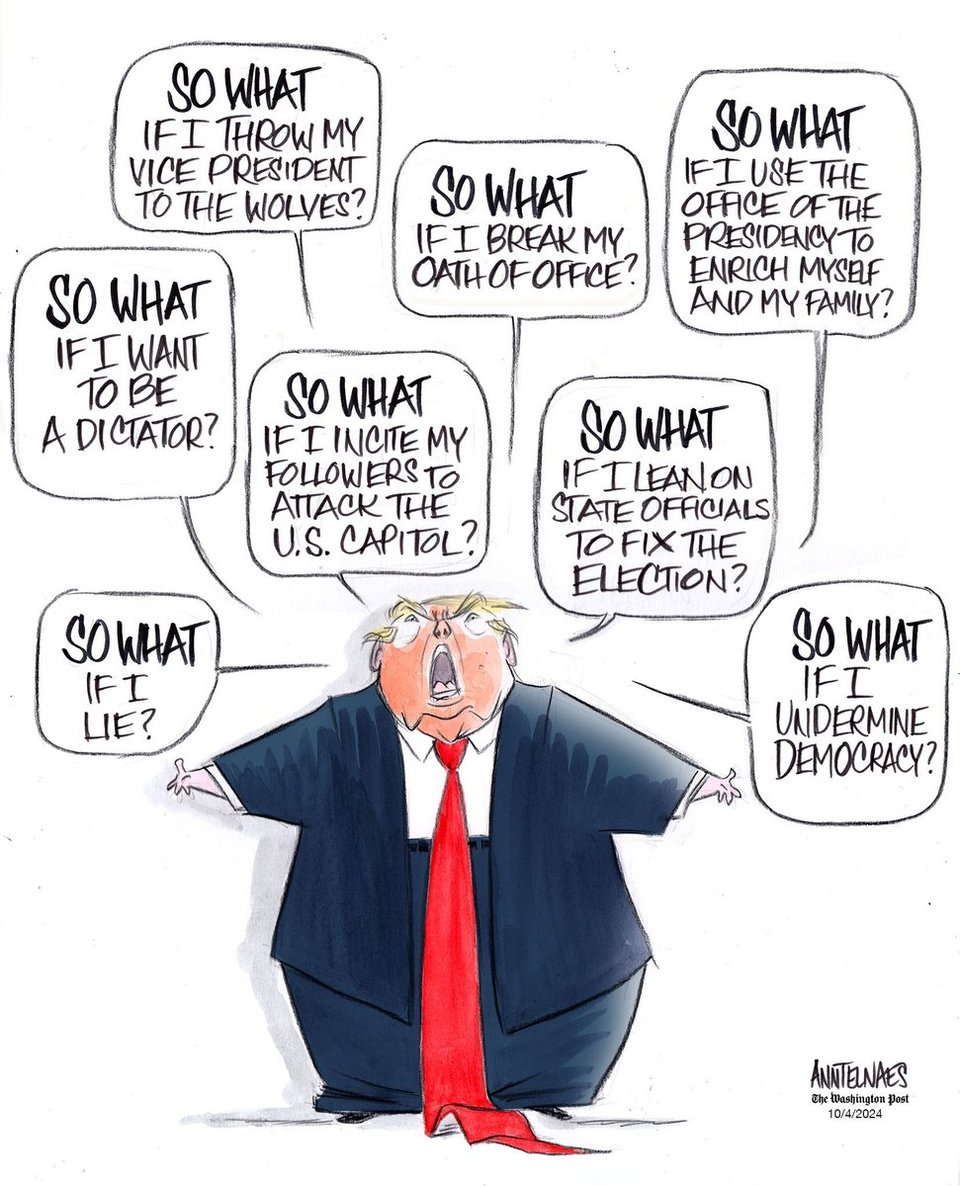
Ann Telnaes, The Washington Post
Is the problem his age?
Peter Baker, the Times
With Mr. Biden out, Mr. Trump, at 78, is now the oldest major party nominee for president in history and would be the oldest president ever if he wins and finishes another term at 82. A review of Mr. Trump’s rallies, interviews, statements and social media posts finds signs of change since he first took the political stage in 2015. He has always been discursive and has often been untethered to truth, but with the passage of time his speeches have grown darker, harsher, longer, angrier, less focused, more profane and increasingly fixated on the past.
According to a computer analysis by The New York Times, Mr. Trump’s rally speeches now last an average of 82 minutes, compared with 45 minutes in 2016. Proportionately, he uses 13 percent more all-or-nothing terms like “always” and “never” than he did eight years ago, which some experts consider a sign of advancing age.
Similarly, he uses 32 percent more negative words than positive words now, compared with 21 percent in 2016, which can be another indicator of cognitive change. And he uses swearwords 69 percent more often than he did when he first ran, a trend that could reflect what experts call disinhibition. (A study by Stat, a health care news outlet, produced similar findings.)
Mr. Trump frequently reaches to the past for his frame of reference, often to the 1980s and 1990s, when he was in his tabloid-fueled heyday. He cites fictional characters from that era like Hannibal Lecter from “Silence of the Lip” (he meant “Silence of the Lambs”), asks “where’s Johnny Carson, bring back Johnny” (who died in 2005) and ruminates on how attractive Cary Grant was (“the most handsome man”). He asks supporters whether they remember the landing in New York of Charles Lindbergh, who actually landed in Paris and long before Mr. Trump was born.
He seems confused about modern technology, suggesting that “most people don’t have any idea what the hell a phone app is” in a country where 96 percent of people own a smartphone. If sometimes he seems stuck in the 1990s, there are moments when he pines for the 1890s, holding out that decade as the halcyon period of American history and William McKinley as his model president because of his support for tariffs.
How much his rambling discourse — what some experts call tangentiality — can be attributed to age is the subject of some debate. Mr. Trump has always had a distinctive speaking style that entertained and captivated supporters even as critics called him detached from reality. Indeed, questions have been raised about Mr. Trump’s mental fitness for years.
John F. Kelly, his second White House chief of staff, was so convinced that Mr. Trump was psychologically unbalanced that he bought a book called “The Dangerous Case of Donald Trump,” written by 27 mental health professionals, to try to understand his boss better. As it was, Mr. Kelly came to refer to Mr. Trump’s White House as “Crazytown.”
Some of Mr. Trump’s cabinet secretaries had a running debate over whether the president was “crazy-crazy,” as one of them put it in an interview after leaving office, or merely someone who promoted “crazy ideas.” There were multiple conversations about whether the 25th Amendment disability clause should be invoked to remove him from office, although the idea never went far. His own estranged niece, Mary L. Trump, a clinical psychologist, wrote a book identifying disorders she believed he has. Mr. Trump bristled at such talk, insisting that he was “a very stable genius.”
The Times analysis found that Mr. Trump speaks at a fourth-grade level, lower than rivals like Gov. Ron DeSantis of Florida, who speaks at an eighth-grade level, which is roughly average for modern presidents.
In 2011, as he was contemplating a run for the presidency, Mr. Trump addressed the Conservative Political Action Conference and sounded more partisan notes. While many of the themes would be familiar to today’s voters, he stuck closer to his script and finished his thoughts more often. His speeches in 2015 and 2016 were more aggressive, but still clearer and more comprehensible than now, and balanced with flashes of humor.
Now his rallies are powered as much by anger as anything else. His distortions and false claims have reached new levels. His adversaries are “lunatics” and “deranged” and “communists” and “fascists.” Never particularly restrained, he now lobs four-letter words and other profanities far more freely. The other day, he suggested unleashing the police to inflict “one really violent day” on criminals to deter crime.
He does not stick to a single train of thought for long. During one 10-minute stretch in Mosinee, Wis., last month, for instance, he ping-ponged from topic to topic: Ms. Harris’s record; the virtues of the merit system; Robert F. Kennedy Jr.’s endorsement; supposed corruption at the F.D.A., the C.D.C. and the W.H.O.; the Covid-19 pandemic; immigration; back to the W.H.O.; China; Mr. Biden’s age; Ms. Harris again; Mr. Biden again; chronic health problems and childhood diseases; back to Mr. Kennedy; the “Biden crime family”; the president’s State of the Union address; Franklin D. Roosevelt; the 25th Amendment; the “parasitic political class”; Election Day; back to immigration; Senator Tammy Baldwin; back to immigration; energy production; back to immigration; and Ms. Baldwin again.
He mispronounces names and places with some regularity — “Charlottestown” instead of “Charlottesville,” “Minnianapolis” instead of “Minneapolis,” the website “Snoops” instead of “Snopes,” “Leon” Musk instead of “Elon.”
In Rome, Ga., he went on an extended riff about Mr. Biden in swim trunks on a beach. “Look, at 81 — do you remember Cary Grant? How good was Cary Grant, right? I don’t think Cary Grant, he was good. I don’t know what happened to movie stars today. We used to have Cary Grant and Clark Gable and all these people. Today we have — I won’t say names because I don’t need enemies. I don’t need enemies. I got enough enemies. But Cary Grant was like, Michael Jackson once told me, ‘The most handsome man, Trump, in the world.’ Who? ‘Cary Grant.’ Well, we don’t have that anymore. But Cary Grant at 81 or 82 — going on 100, this guy, he’s 81 going on 100 — Cary Grant wouldn’t look too good in a bathing suit either, and he was pretty good-looking, right?”
Talking on another occasion about how tough illegal immigrants are, he drifted off into a soliloquy about whether actors could portray them in a movie: “They can’t play the role. They’ll bring in a big actor and you look and you say, ‘Look, he’s got no muscle content. He’s got no muscle! We need a little muscle!’ Then they bring in another one. ‘But he’s got a weak face! He looks weak!’” Still, he has rather high regard for his own physique. “I could have been sunbathing on the beach,” he said at another point. “You have never seen a body so beautiful. Much better than Sleepy Joe.”
He considers himself the master of nearly every subject. He said Venezuelan gangs were armed “with MK-47s,” evidently meaning AK-47s, and then added, “I know that gun very well” because “I’ve become an expert on guns.” He claims to have been named “man of the year” in Michigan, although no such prize exists.
He is easily distracted. He halted in the middle of another extended monologue when he noticed a buzzing insect. “Oh, there’s a fly,” he said. “Oh. I wonder where the fly came from. See? Two years ago, I wouldn’t have had a fly up here. You’re changing rapidly. But we can’t take it any longer.”
But like some people approaching the end of their eighth decade, he is not open to correction. “Trump is never wrong,” he said recently in Wisconsin. “I am never, ever wrong.”
(New York Times. Peter Baker, chief White House Correspondent for the Times, not only co-wrote the article above, but put together a video of Trump’s rants and ramblings. To read the full article, click here.
To watch the video of Trump’s deranged rants and ramblings, click here.
Pennsylvania.
On Saturday, at a rally in Butler, Pennsylvania (where there had been an attempt to assassinate him), Trump suggested that his political opponents “maybe tried to kill me.”
“Over the past eight years, those who want to prevent me from achieving that future have smeared me, isolated me, accused me, tried to keep me out of the race, and who knows? Maybe they tried to kill me, but I have never stopped fighting for you and I never will.”
North Carolina.
Charlotte Observer: Shame on Trump for trying to politicize NC’s Helene tragedy
Western North Carolina is trying to pick up the pieces left behind by Hurricane Helene, which decimated the region, leaving communities destroyed and a death toll in the triple digits. This is not a situation to capitalize on for political gain. But former President Donald Trump has politicized the situation at every turn, spreading falsehoods and conspiracies that fracture the community instead of bringing it together.
The worst example is a social media post Trump made on Monday, in which he accused the federal government and Democratic Gov. Roy Cooper of “going out of their way to not help people in Republican areas. MAGA!” That same day, Trump also posted that the Biden administration has “left Americans to drown” in North Carolina and other states. Then, in an interview with his former adviser Kellyanne Conway, Trump doubled down on his claim, saying the government is “going out of their way to hurt” Trump voters in Western North Carolina.
“They’re not getting water, they’re not getting anything,” Trump said.
Trump has also said that Georgia Gov. Brian Kemp couldn’t get President Joe Biden on the phone to help his state with hurricane relief — a claim that Kemp himself debunked — and falsely claimed that the government doesn’t have enough money to respond to the disaster because “Kamala spent all her FEMA money, billions of dollars, on housing for illegal migrants.” He’s called it “the worst response in the history of hurricanes” and suggested it would be the Biden administration’s own Hurricane Katrina. There’s no evidence to support any of those ridiculous claims. And by every indication, state and federal agencies have been working to help people in need. They’ve been airlifting food and other supplies to affected areas. Helping families get information about missing loved ones. Providing monetary assistance to folks whose homes were destroyed. Working to clear and repair roads and get critical infrastructure back up and running. It may not be enough, because this is one of the worst disasters our state has ever seen. It will take months and years to rebuild, and we still won’t be able to recover everything that was lost. But the people of North Carolina have not been left out to dry. Their government has not abandoned them. The Republican governors of Georgia and South Carolina have expressed satisfaction with the federal response.
Trump knows that. So does Lt. Gov. Mark Robinson, who accused Cooper and Biden of not doing enough to prepare for and respond to the storm. Robinson has used the tragedy for photo ops and posts on social media and predicted he will be called a “hero” for his efforts to help victims, despite the fact that he missed a key vote to declare a state of emergency in preparation for the storm. Trump’s claims are as hypocritical as they are harmful.
POLITICO’s E&E News reported this week that, as president, Trump could be “flagrantly partisan” in times of disaster and “on at least three occasions hesitated to give disaster aid to areas he considered politically hostile or ordered special treatment for pro-Trump states.” According to the report, Trump was hesitant to send disaster aid when California was ravaged by wildfires in 2018 until he learned the affected part of the state was saturated with Trump voters. Let’s be clear: Western North Carolina is not a political football. This is not a campaign opportunity. The most unhelpful thing any politician — or anyone else — can do right now is spread misinformation and tell people that their government isn’t doing anything to help them.
Sowing the seeds of political division is always an unnecessary and tiresome endeavor. But doing so in times of great need, when unity is paramount, is particularly shameful. (Charlotte Observer)
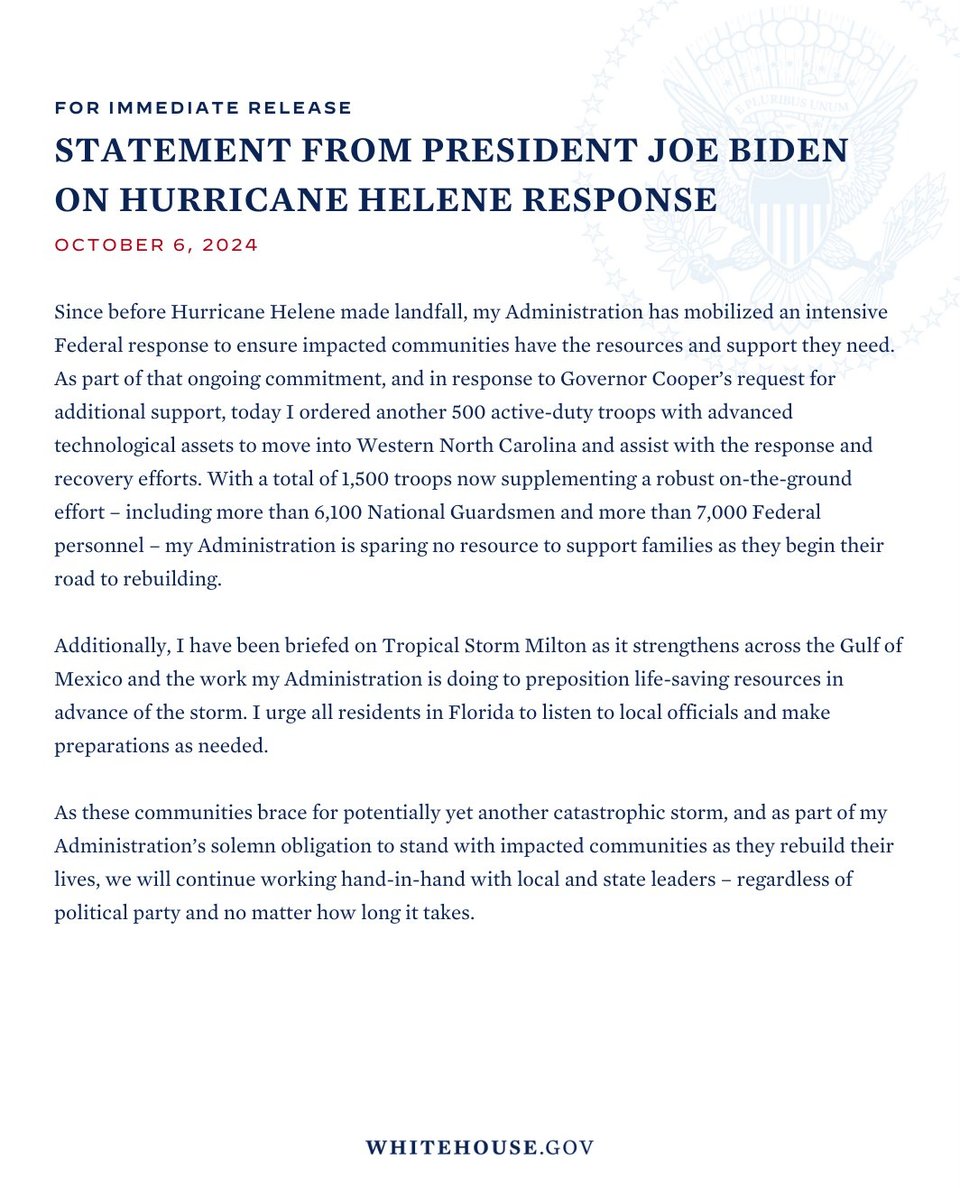
https://x.com/potus/status/1842187917680078878?s=61&t=I_Od53CbnPTsbLcD0baXPg
Speaker Mike Johnson will NOT be calling the House back early to vote on a disaster aid supplemental in the wake of the Hurricane.
— Olivia Beavers (@Olivia_Beavers) October 6, 2024
He tells me the cost of damages has to be “tabulated” before a supplemental is considered and he argued they are a ways away from that. Congress… https://t.co/dJljNftfi9
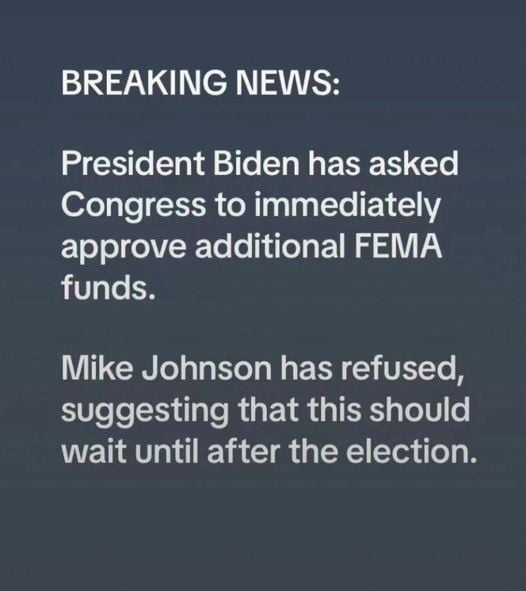
Wisconsin.
Trump accused Kamala Harris of murder during his speech today in Wisconsin: "She murdered him. In my opinion Kamala murdered him. Just like she had a gun in her hand." pic.twitter.com/oBeUyLLUpy
— Aaron Rupar (@atrupar) October 1, 2024
Felon Trump killed the border bill, so according to his logic, HE murdered them, just like he had a gun in his hand. Justice is late. America deserves better. #VoteBlue pic.twitter.com/vZ5G5JiGj6
— 🌻Justice⚖Now 🌟🇺🇸 (@ChrisJustice01) October 1, 2024
He started with Jews, then moved to Catholics, and now senior citizens.
— Republicans against Trump (@RpsAgainstTrump) September 25, 2024
“If any senior doesn't vote for Trump, we are gonna have to send you to a psychiatrist to have your head examined."
pic.twitter.com/wjntbIEwiJ
Americans live abroad too. They can vote.
Tell them.
Watch House Democratic Leader, Hakeem Jeffries on Why Voting from Abroad Matters! ✨@RepJeffries highlights how absentee voting is crucial for Americans abroad. 🗳️
— Democrats Abroad UK (@demsabroaduk) October 5, 2024
Watch, get inspired, and request your absentee ballot at https://t.co/zjNIGHlShF! pic.twitter.com/bhVnUhO1ZR
TOMORROW is the last day to register to vote for the general election in the following states: Arkansas, Arizona, Florida, Georgia, Indiana, Kentucky, Mississippi, Ohio, Tennessee, and Texas.
— VoteHub (@VoteHubUS) October 7, 2024
Visit https://t.co/V7bBXYgbr5 to register, update, or check your voter registration. 🗳️
Your Daily Reminder
Trump is a convicted felon.
On May 30th, he was found guilty on 34 felony counts by the unanimous vote of 12 ordinary citizens.
The Convicted Felon Donald J. Trump was scheduled to be sentenced on July 11th and September 18th. He will now be sentenced on November 26.
Trump is a f*cking criminal pic.twitter.com/To2zOPf1Z8
— TheRealThelmaJohnson (@TheRealThelmaJ1) October 2, 2024